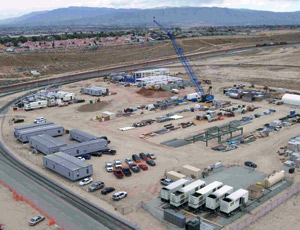Carter & Burgess Inc., a unit of Jacobs Engineering Group, will be back in a California court on Feb. 28, seeking dismissal of a December ruling ordering the company to pay the city of Victorville $52.1 million over a failed powerplant project. The project’s price tag had more than quintupled before it was scrapped for parts in 2006.

Riverside County Superior Court Judge Ronald Taylor ruled on Dec. 17 against the Fort Worth-based engineer, which was acquired by Jacobs in 2007.
Following a seven-week trial, the jury ordered Carter & Burgess to make a cash payment for damages to compensate the city for “professional negligence, misrepresentation and breach of contractual and fiduciary duty” over the failed 17.5-MW Foxborough cogeneration powerplant.
The firm was hired in 2003 for turnkey services on three city utility projects, including the $22-million Foxborough plant, which a Carter & Burgess feasibility study had recommended. The Industrial Co., a unit of Kiewit Corp., Omaha, Neb., was the contractor. The original schedule called for the plant to be finished in 2006, court documents say. “Carter & Burgess provided the city with misleading pro formas and used inflated revenue numbers,” says Glenn E. Turner, the city’s Los Angeles-based attorney. Jacobs officials could not be reached for comment.
Construction costs ballooned to $60 million before the city pulled the plug in June 2006. Another $50 million was needed to finish the 75%-complete plant, the city claims, making it cost-prohibitive. Victorville eventually recouped $8 million by selling off parts and pieces and refinancing its project bond debt. Carter & Burgess sued the city in 2008 for $106,196 in unpaid fees, after receiving $8.2 million for the Foxborough job.
The city responded with a 2009 countersuit. “They did the work. They just did it borderline recklessly,” Turner says. “The city relied on them for everything.” According to Carter & Burgess’ filings, the city “continually … made major changes” that drove up costs.


Post a comment to this article
Report Abusive Comment